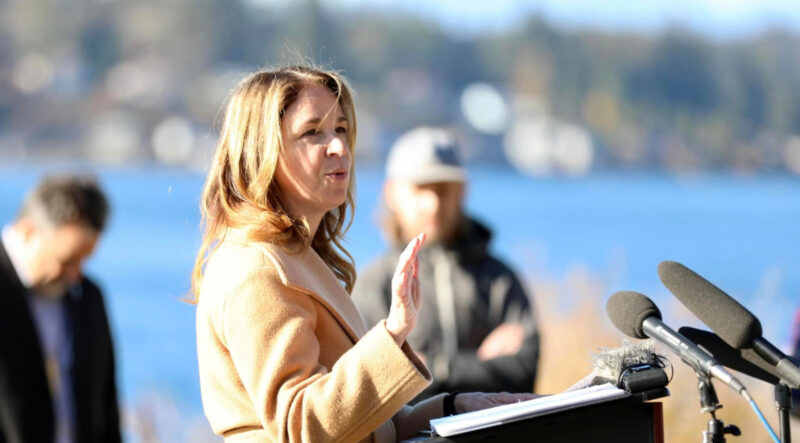Fishy salmon farming ban by Franz under fire
Activists in the Pacific Northwest keep pumping out falsehoods and junk science to vilify salmon aquaculture as demand for farmed seafood grows around the world
By Fabian Dawson
SeaWestNews
Washington state’s Public Lands Commissioner Hilary Franz is under increasing fire for her unilateral decision to ban net-pen aquaculture, as leading seafood trade groups say the move is tied to her political ambitions and has little to do with science.
The Northwest Aquaculture Alliance, has now been joined by six other leading seafood trade associations as well as respected fisheries scientists, veterinarians, and fish health professionals, calling for a third-party review of the science upon which Franz made her decision.
They include the National Fisheries Institute, National Aquaculture Association, Global Seafood Alliance, Best Aquaculture Practices, California Aquaculture Association, and the US Trout Farmers Association.
Franz last week suddenly cancelled the leases of Canadian seafood farmer Cooke Aquaculture Pacific, which is in partnership with Jamestown S’Klallam Tribe to raise Steelhead, and followed it up with an executive order to ban the State’s 40-year tradition of fish farming in Puget Sound.
“You got it wrong,” said the seafood coalition, adding that the ban “should concern every business that leases public lands here in Washington”.
Franz who is seeking re-election with an eye on the governor’s mansion, is being supported by anti-salmon farming activists, including the Wild Fish Conservancy (WFC), which took out a full-page ad in the Seattle Times declaring, “WE WON!”
The seafood coalition said Franz has also launched a fundraising appeal tied to her decision called “Protect Puget Sound.”
“The funds will be used solely by Hilary Franz to line her coffers for future political activities — and do so on the backs of hard-working people,” said the coalition.
“In the next several days, we will deliver a letter to Commissioner Franz, asking some tough questions about the science that DNR (Washington’s Department of Natural Resources) used to make its decision. Was this science from the nation’s leading science agency, NOAA, or did it come from groups such as the WFC, an ENGO with a track record of suing state agencies, the federal government, hatcheries, and private enterprise to line its coffers?”
Franz’s decision will immediately impact 34 employees of Cooke Aquaculture Pacific, many who are second-generation fish farmers, and many who have worked as fish farmers for well over three—and as many as five—decades.
“The unfortunate timing of this announcement, at the beginning of the holiday season — with an impossible December 14 deadline to remove equipment and slaughter 332,000 juvenile fish, representing 2,656,000 meals — shows both a lack of humanity and an alarming lapse of leadership,” said NWAA.
Franz’s decision comes in the wake of a January 2020 landmark 9-0 ruling, where the Washington State Supreme Court found the claims about disease and sea lice impacting wild stocks, that have been falsely and widely propagated by anti-fish farm activists in the Pacific Northwest, to be without merit.
In neighbouring BC, activists emboldened by Franz’s decision have ratcheted up their campaign against salmon farming by releasing yet another dubious study claiming that 70 per cent of salmon waste samples collected from fish farms tested positive for genetic traces of Piscine orthoreovirus (PRV). They do not provide a control reference.
The study, authored by activists-linked scientists whose work in the field has already been widely discredited, also claimed without evidence, that PRV is coming from salmon hatcheries.
“The authors also suggest, without evidence, that PRV is coming from salmon hatcheries, when in reality fish are screened for PRV before leaving hatcheries into ocean pens, and PRV is not detected in commercial hatcheries. Additionally, experimental studies have indicated that infection with PRV does not have negative effects on wild salmon,” the BC Salmon Farmers Association (BCSFA) said.
Industry officials said they expect to see more of these dubious quasi-science being released by the activists to pressure the Federal Government to ban salmon farming on Canada’s west coast.
“Politics not science rules fish farming in Canada these days and these studies are aimed at disrupting the transition process and garnering headlines,” said an industry official.
Like Franz in Washington, the Trudeau Liberals in a pre-election pledge, to primarily secure votes from the anti-fish farming lobby, said it will come up with a plan to transition open-net aquaculture operations in BC by 2025.
Fisheries Minister Joyce Murray has moved that timeline up saying she will have a transition plan in place next year and a new licensing regime devised by June 2024. She has also made it clear that transitioning open-net salmon farms in British Columbia’s waters, does not necessarily mean ousting fish farmers from the oceans to land-based operations.
“This does not sit well with the activists whose sole objective is to kill the industry claiming it will bring back wild stocks, which it won’t,” he said.
Canada is the fourth-largest producer of farmed salmon in the world with 97 per cent of salmon produced in Canada being farm-raised, which is key to reducing pressure on limited wild stocks.
Aquaculture employs about 14,000 in full-time, well-paying jobs that are primarily located in smaller coastal and rural communities. Canada’s farmed-salmon industry provides more than 10,000 jobs alone, the majority of which are in coastal areas of British Columbia and New Brunswick.
The aquaculture industry also generates a little more than half a billion dollars in labour income.
The United States, recognising the urgent need to increase seafood production in its waters, recently unveiled a 5-Year Strategic Plan for Aquaculture.
(Facebook image of Washington state’s Public Lands Commissioner Hilary Franz)

